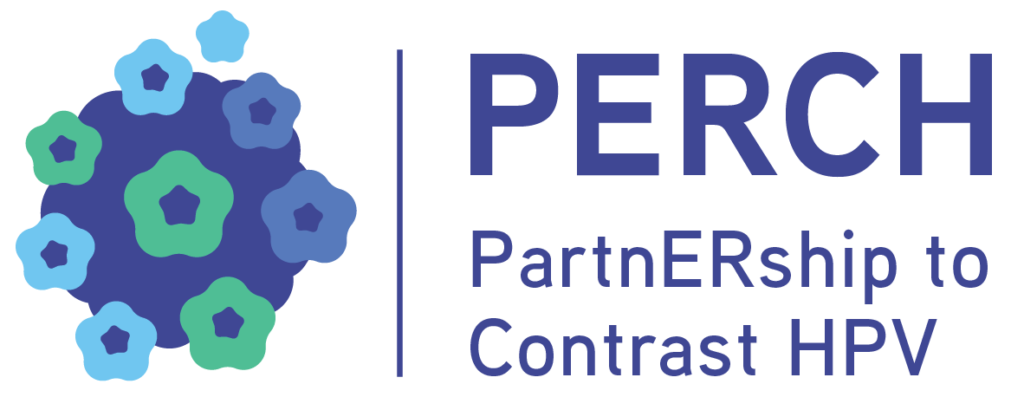As part of Work Package 4 (WP4) Integration and Sustainability and Work Package 2 (WP2) Communication and Dissemination, the PERCH initiative aims to improve the capacity of European Member States (MS) to effectively plan and implement HPV vaccination actions and campaigns. Task 4.6 (WP4) focuses on the launch of vaccination actions and pilot actions, while MS develop national HPV communication strategies under Task 2.4 (WP2). These tasks work together to increase HPV vaccination coverage across Europe by leveraging the shared knowledge and strategies of MS.
To take into account the different needs and available resources of the participating countries, each country will implement at least one of the following activities by the end of the project:
– Launch a national HPV Vaccination Action (T4.6)
– Pilot an HPV Vaccination Action (T4.6)
– Develop a national HPV communication strategy (T2.4)
– Share their experience (T2.4)
This flexible approach ensures that each Member State can make an effective contribution to the overall goal of increasing HPV vaccination coverage.
Develop national HPV communication strategies and share experiences
Member States that already have high HPV coverage and successfully communicate about HPV share their knowledge and experience in Working Group 2, which meets regularly and already has over 80 members, communication and HPV experts.
Within this group, which is led by the Institute of Oncology Ljubljana, a guideline for the creation of a national HPV communication strategy is also being developed. The first draft was reviewed by the members at the WP2 meeting in Ljubljana and is now being updated, also with the help of experts from Norway and some other countries. 7 MS will develop a national communication strategy: Croatia, Czech Republic, Estonia, Hungary, Lithuania, Romania and Slovenia.
National HPV Vaccination Action and Pilot Actions
Member States participating in Task 4.6 have the option to:
1. Launch a National HPV vaccination action, which is an intervention aimed at increasing HPV vaccination coverage at the national level. This action itself can be implemented at national for subnational scales.
2. Launch an HPV vaccination pilot action, which is a small-scale intervention at the subnational level or targeting a specific at-risk population. A pilot action serves as a testing ground for innovative approaches that may be expanded if proven effective.
Member States have already started their initiatives and here are some key highlights:
• Belgium hosted a meeting in September 2024, that brought together vaccination programme managers from the three Belgian communities and the Belgian Cancer Registry. The aim was to indirectly increase HPV vaccination coverage by sharing JA findings and recommendations, strengthening data systems, and promoting collaboration between communities. For further information, please contact Sophie Denoel at sophie.denoel@sciensano.be .
• Estonia is running a National HPV vaccination campaign with a three-step action plan, including an information leaflet campaign, a social media campaign, and a GP helpline. For more information, please contact Jaak Jänes at jaak.janes@tai.ee.
• As part of the introduction of school-based vaccination, France is running a national vaccination campaign in schools using multi-channel communications. For further information, please contact Alexandre Cobigo at acobigo@institutcancer.fr .
• Germany is launching an HPV vaccination campaign aimed at parent-friendly online environments and social media, with a focus on interactive engagement with parents. Additionally, a dedicated landing page will offer comprehensive information on HPV vaccination for parents. For further details, please contact Miriam Gerlich at perchWP7@bzga.de .
• Greece is organising webinars, podcasts for healthcare professionals and the public, and a social media campaign. For additional information, please contact Anastasia Mpalasopoulou at ampalasopoulou@1dype.gov.gr .
• Hungary is running a national vaccination campaign with activities in schools (posters, presentations at parents’ meetings, letters to parents), social media campaigns, YouTube films, and information for professionals (through workshops, meetings, professional websites). For further information please contact Péter Csizmadia at csizmadia.peter@nngyk.gov.hu .
• Italy is implementing school-based HPV vaccination campaigns in pilot regions. For more details, contact Raffaella Bucciardini at raffaella.bucciardini@iss.it .
• Lithuania is developing a real-time HPV vaccination dashboard to monitor coverage, enhancing communication to parents/guardians, and promoting vaccination among healthcare professionals. For more details, contact Brigita Kairienė at brigita.kairiene@nvsc.lt .
• Poland is conducting an HPV vaccination campaign via social media and updating the HPV vaccination page on the national vaccination website for improved acceptance of vaccinations among Polish parents and accessibility to Ukrainian refugees. For more details, contact Ewa Augustynowicz at eaugustynowicz@pzh.gov.pl .
• Slovakia is setting up a National HPV coalition to develop a strategy for a unified communication approach focusing on children, parents, teachers and general practitioners. For more information, please contact Natália Ballová at natalia.ballova@health.gov.sk .
• Slovenia launched an HPV vaccination campaign in September 2023, based among other things on the booklet “Deadly Serious about HPV” written by the well-known youth author Desa Muck. Another HPV vaccination media campaign is underway. For more information, please contact Elizabeta Radelj Pepevnik at eradelj@onko-i.si .
• In June 2024, Spain held a workshop on communication tools in vaccination crises for regional vaccination programme managers. For more information, contact Maria Brotons at mbrotons@iconcologia.net .


